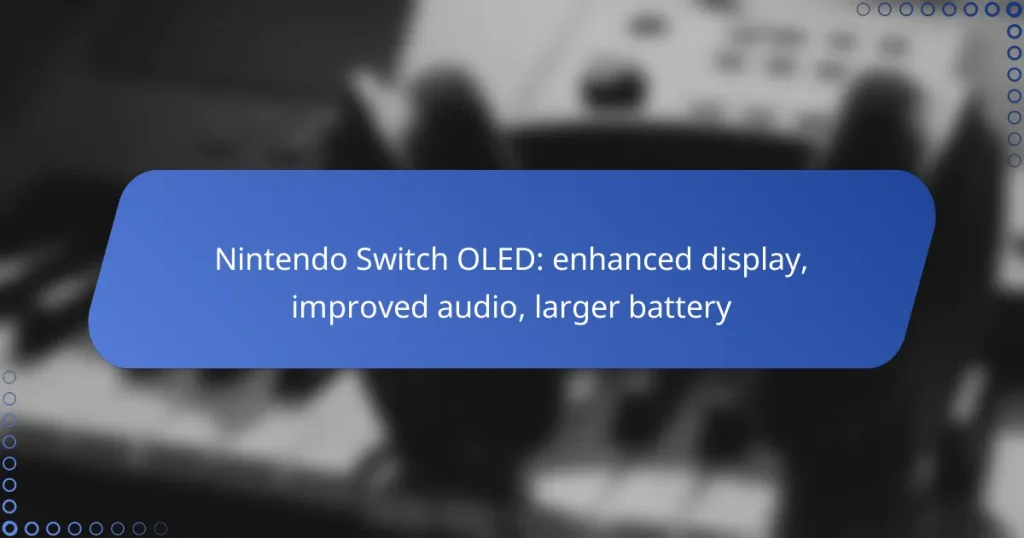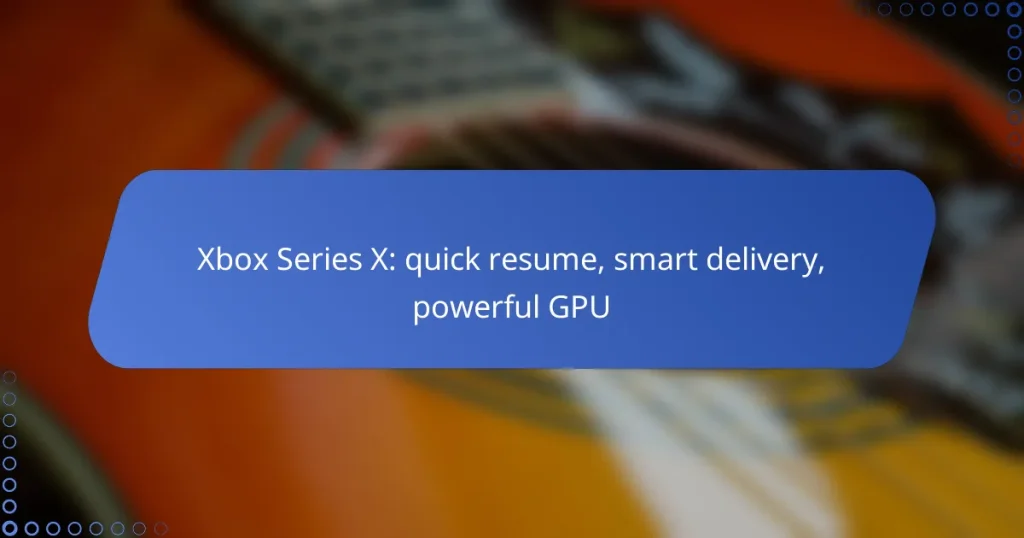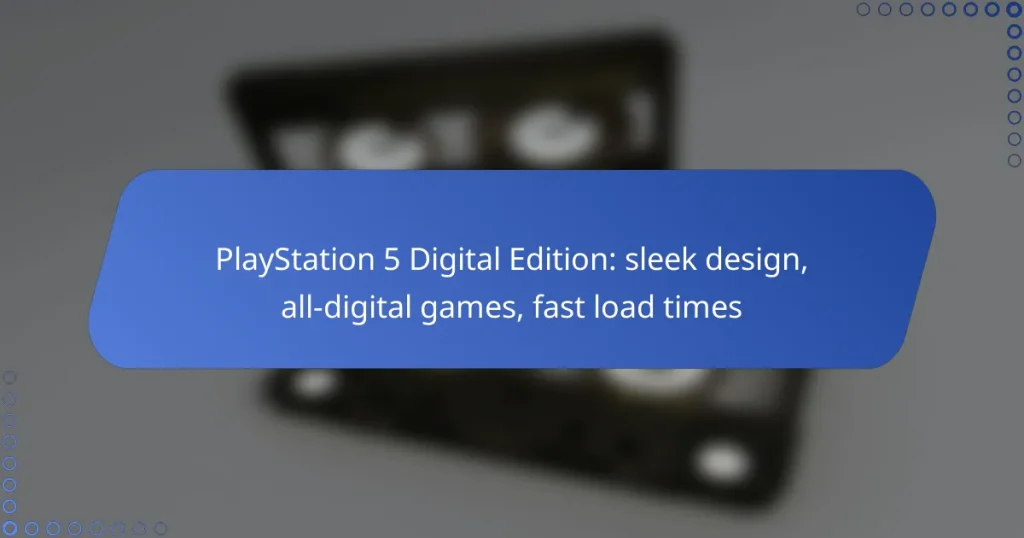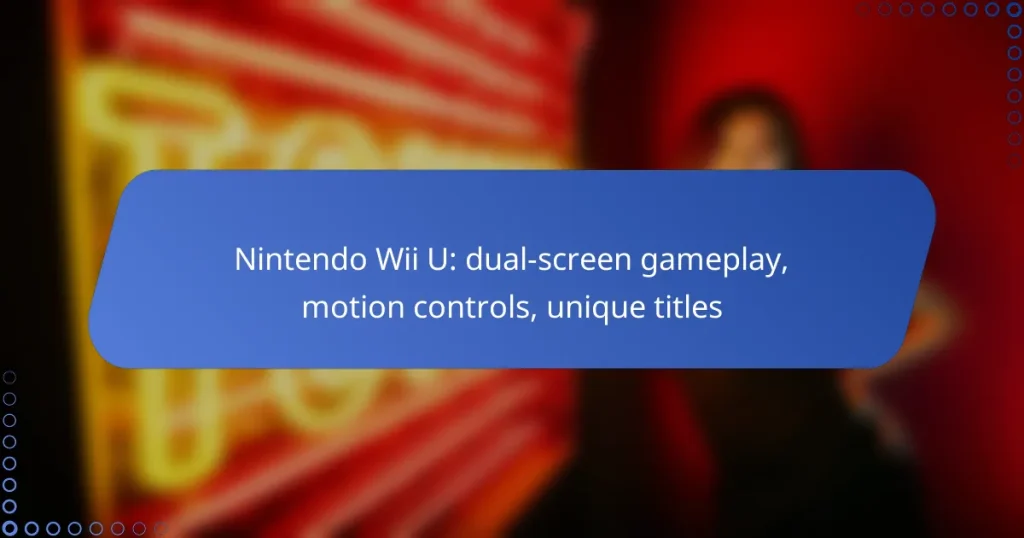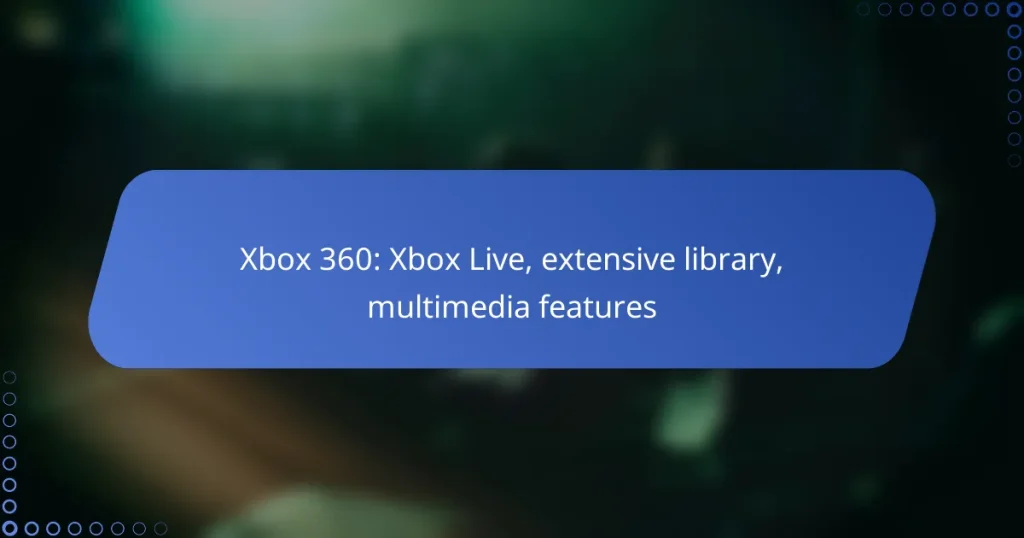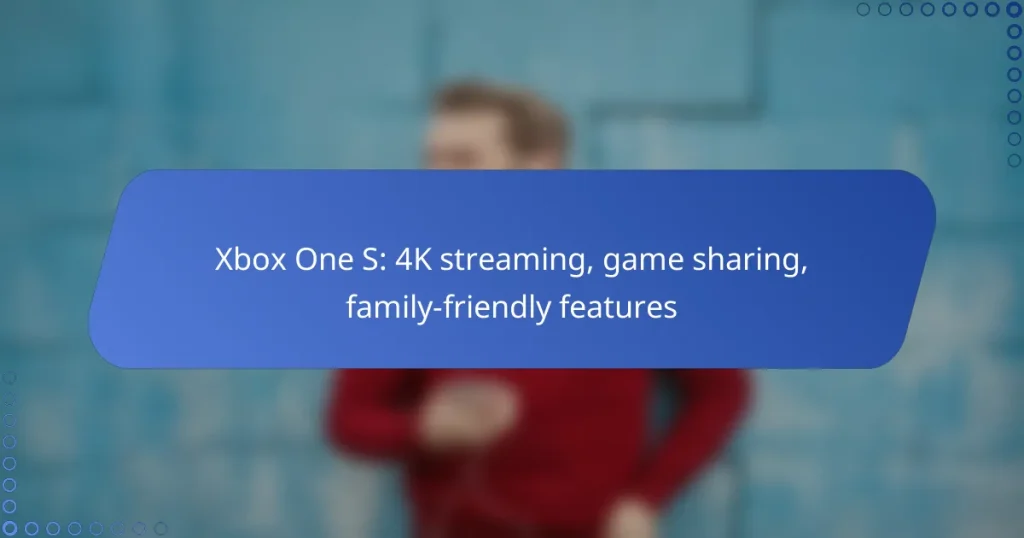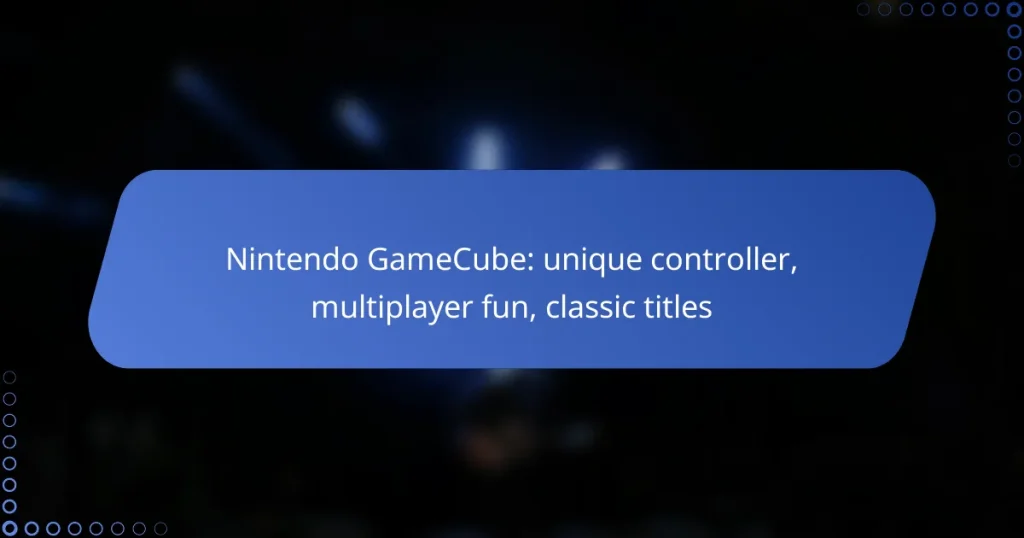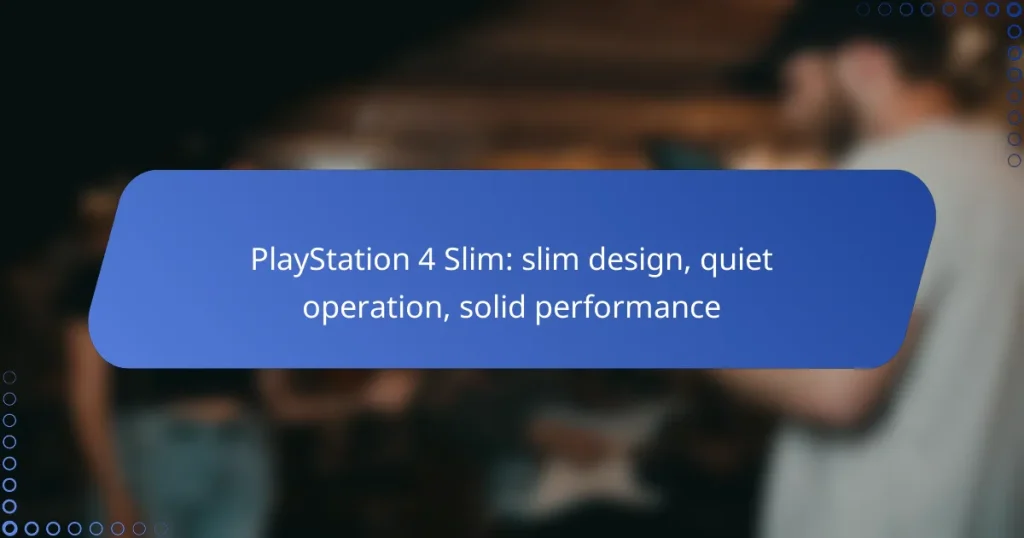Modern gaming consoles have transformed the gaming landscape with their advanced features, such as high-definition graphics, rapid processing capabilities, and robust online multiplayer options. Notable systems like the PlayStation 5 and Xbox Series X each bring unique advantages, influencing gamers’ preferences through exclusive titles and subscription services. Additionally, cloud gaming technology allows for seamless game streaming, enhancing accessibility and flexibility for players without the need for extensive hardware investments.
Xbox Series X: quick resume, smart delivery, powerful GPU
PlayStation 3: media capabilities, online features, classic games
PlayStation 5 Digital Edition: sleek design, all-digital games, fast load times
Nintendo Wii U: dual-screen gameplay, motion controls, unique titles
Xbox 360: Xbox Live, extensive library, multimedia features
Xbox One S: 4K streaming, game sharing, family-friendly features
Nintendo GameCube: unique controller, multiplayer fun, classic titles
PlayStation 4 Pro: 4K upscaling, HDR support, extensive library
PlayStation 4 Slim: slim design, quiet operation, solid performance
What are the key features of modern gaming consoles?
Modern gaming consoles offer a range of advanced features that enhance the gaming experience, including high-definition graphics, fast processing power, online multiplayer capabilities, exclusive game titles, and backward compatibility. These features collectively contribute to immersive gameplay and a vibrant gaming community.
High-definition graphics
High-definition graphics are a hallmark of modern gaming consoles, providing stunning visuals that enhance gameplay. Most consoles support resolutions up to 4K, allowing for detailed textures and vibrant colors that bring games to life.
When choosing a console, consider the graphical capabilities, especially if you have a 4K TV. Look for features like HDR (High Dynamic Range) support, which improves contrast and color accuracy, making the gaming experience even more engaging.
Fast processing power
Fast processing power is essential for smooth gameplay and quick load times. Modern consoles are equipped with powerful CPUs and GPUs that can handle complex graphics and physics calculations, resulting in a more fluid gaming experience.
For optimal performance, consider consoles with solid-state drives (SSDs), which significantly reduce load times compared to traditional hard drives. This can enhance your gaming experience by allowing you to jump into games almost instantly.
Online multiplayer capabilities
Online multiplayer capabilities enable gamers to connect and compete with others around the world. Most modern consoles offer robust online services that support voice chat, matchmaking, and community features.
When selecting a console, check the subscription options for online services. Many consoles offer free online play, while others may require a paid subscription for access to premium features and dedicated servers.
Exclusive game titles
Exclusive game titles are games that are only available on specific consoles, often showcasing the unique capabilities of that platform. These titles can be a significant factor in choosing a console, as they often include popular franchises and critically acclaimed games.
Research the exclusive titles available for each console to ensure it aligns with your gaming preferences. Some consoles may have a stronger lineup of exclusive games, which can enhance your overall gaming experience.
Backward compatibility
Backward compatibility allows players to enjoy games from previous console generations on newer systems. This feature is increasingly important for gamers who have invested in a library of games and want to continue playing them.
When considering a console, check its backward compatibility options. Some consoles support a wide range of older titles, while others may have limited compatibility. This can influence your decision, especially if you have favorite games from previous generations.
How do PlayStation 5 and Xbox Series X compare?
The PlayStation 5 and Xbox Series X are two leading gaming consoles, each offering unique features and advantages. While both provide impressive graphics and performance, their differences in exclusive games, subscription services, and overall ecosystem can influence a gamer’s choice.
Performance benchmarks
In terms of performance, the Xbox Series X generally boasts slightly higher specifications, including a more powerful GPU, which can translate to better frame rates and resolution in some games. The PlayStation 5, however, features a custom SSD that significantly reduces load times, enhancing the overall gaming experience.
Both consoles support 4K gaming and up to 120 frames per second, making them suitable for high-end gaming setups. Gamers should consider their priorities: if graphics fidelity is paramount, the Xbox may edge out, but for faster load times and seamless gameplay, the PlayStation 5 excels.
Exclusive game libraries
Exclusive titles can heavily influence console choice. The PlayStation 5 offers critically acclaimed games like “Demon’s Souls” and “Ratchet & Clank: Rift Apart,” which are not available on Xbox. Conversely, the Xbox Series X features exclusives such as “Halo Infinite” and “Forza Horizon 5,” appealing to fans of those franchises.
Additionally, PlayStation’s strong focus on single-player narratives contrasts with Xbox’s emphasis on multiplayer experiences. Gamers should evaluate which exclusive games align with their preferences to make an informed decision.
Subscription services
Subscription services play a significant role in the gaming experience. PlayStation Plus offers online multiplayer, free monthly games, and exclusive discounts, while PlayStation Now provides access to a vast library of games for streaming or download.
On the other hand, Xbox Game Pass is often regarded as a standout service, allowing subscribers to access a large library of games, including new releases on launch day. This can be a cost-effective option for gamers who play a variety of titles. Evaluating these services can help determine which console offers better long-term value based on gaming habits.
What are the benefits of cloud gaming on consoles?
Cloud gaming on consoles offers players the ability to stream games directly from the internet, eliminating the need for extensive local storage and high-end hardware. This technology allows for a more flexible gaming experience, making it easier to access and enjoy a variety of games without significant upfront investment.
Access to a wider game library
One of the primary advantages of cloud gaming is the access to an extensive library of games. Players can enjoy a diverse selection without needing to purchase each title individually. Services often include popular games across various genres, allowing gamers to explore new titles and experiences.
For instance, platforms like Xbox Cloud Gaming and PlayStation Now provide subscriptions that grant access to hundreds of games, making it easy to try out new releases or revisit classics without additional costs.
Reduced hardware costs
Cloud gaming significantly lowers the hardware requirements for playing modern games. Since the processing is done on remote servers, players do not need to invest in the latest consoles or powerful PCs. This can save hundreds of dollars, making gaming more accessible to a broader audience.
Additionally, users can play on various devices, including tablets and smartphones, which typically have lower price points than dedicated gaming hardware. This flexibility allows gamers to enjoy high-quality experiences without the burden of expensive equipment.
Cross-platform play
Many cloud gaming services support cross-platform play, enabling gamers to connect with friends regardless of the device they are using. This feature enhances social interaction and community engagement, as players can team up or compete against each other seamlessly.
For example, a player on a console can easily join a game with friends on a PC or mobile device, fostering a more inclusive gaming environment. This capability is increasingly important as gaming communities grow and diversify across platforms.
What should you consider when choosing a gaming console?
When selecting a gaming console, consider your budget, the available game library, and the hardware specifications. These factors will significantly influence your gaming experience and satisfaction with your purchase.
Budget and pricing
Your budget is a crucial factor when choosing a gaming console, as prices can vary widely. Consoles typically range from around $300 to $500, depending on the model and features. Additionally, consider ongoing costs such as subscription services and game purchases.
Look for sales or bundles that may offer better value. For instance, during holiday seasons, many retailers provide discounts or package deals that can save you money.
Game library and exclusives
The game library is essential when selecting a console, as it determines the titles you can play. Each console has its exclusive games that may appeal to different audiences, such as action, adventure, or sports genres.
Research the exclusive titles available on each platform. For example, PlayStation is known for franchises like “God of War” and “The Last of Us,” while Xbox offers titles such as “Halo” and “Gears of War.” Make sure the console you choose has games that interest you.
Hardware specifications
Hardware specifications, including processing power, graphics capabilities, and storage options, play a vital role in your gaming experience. Modern consoles often feature advanced processors and high-resolution graphics, which enhance gameplay and visual quality.
Consider the storage capacity as well, since many games require significant space. Consoles typically offer options ranging from 500 GB to several terabytes. If you plan to download many games, opt for a model with higher storage or consider external storage solutions.
What are the emerging trends in gaming consoles?
Emerging trends in gaming consoles include advancements in cloud gaming, increased focus on cross-platform play, and enhanced virtual reality experiences. These trends are reshaping how players interact with games and each other, making gaming more accessible and immersive.
Cloud Gaming Services
Cloud gaming allows players to stream games directly to their consoles or devices without the need for physical copies or extensive hardware. This service can significantly reduce the cost of entry for gamers, as they can access a library of games for a monthly subscription fee, typically ranging from $10 to $20.
However, a stable internet connection is crucial for a smooth experience. Players should ensure they have a high-speed connection, ideally above 25 Mbps, to minimize latency and buffering issues. Popular services include Xbox Cloud Gaming and PlayStation Now.
Cross-Platform Play
Cross-platform play enables gamers on different consoles to play together, breaking down barriers between platforms. This trend is gaining traction as more developers recognize the demand for a unified gaming experience.
When considering cross-platform capabilities, check if your favorite games support this feature. Many popular titles, such as Fortnite and Call of Duty, allow players from various consoles to compete against each other, enhancing the gaming community.
Virtual Reality Integration
Virtual reality (VR) integration in gaming consoles is becoming more prevalent, offering immersive experiences that traditional gaming cannot match. Consoles like the PlayStation 5 support VR headsets, allowing players to engage in fully interactive environments.
Investing in VR can be costly, with headsets priced from a few hundred to over a thousand dollars. However, the experience can be transformative, making it worth considering for avid gamers. Look for bundles that include games to maximize your investment.
